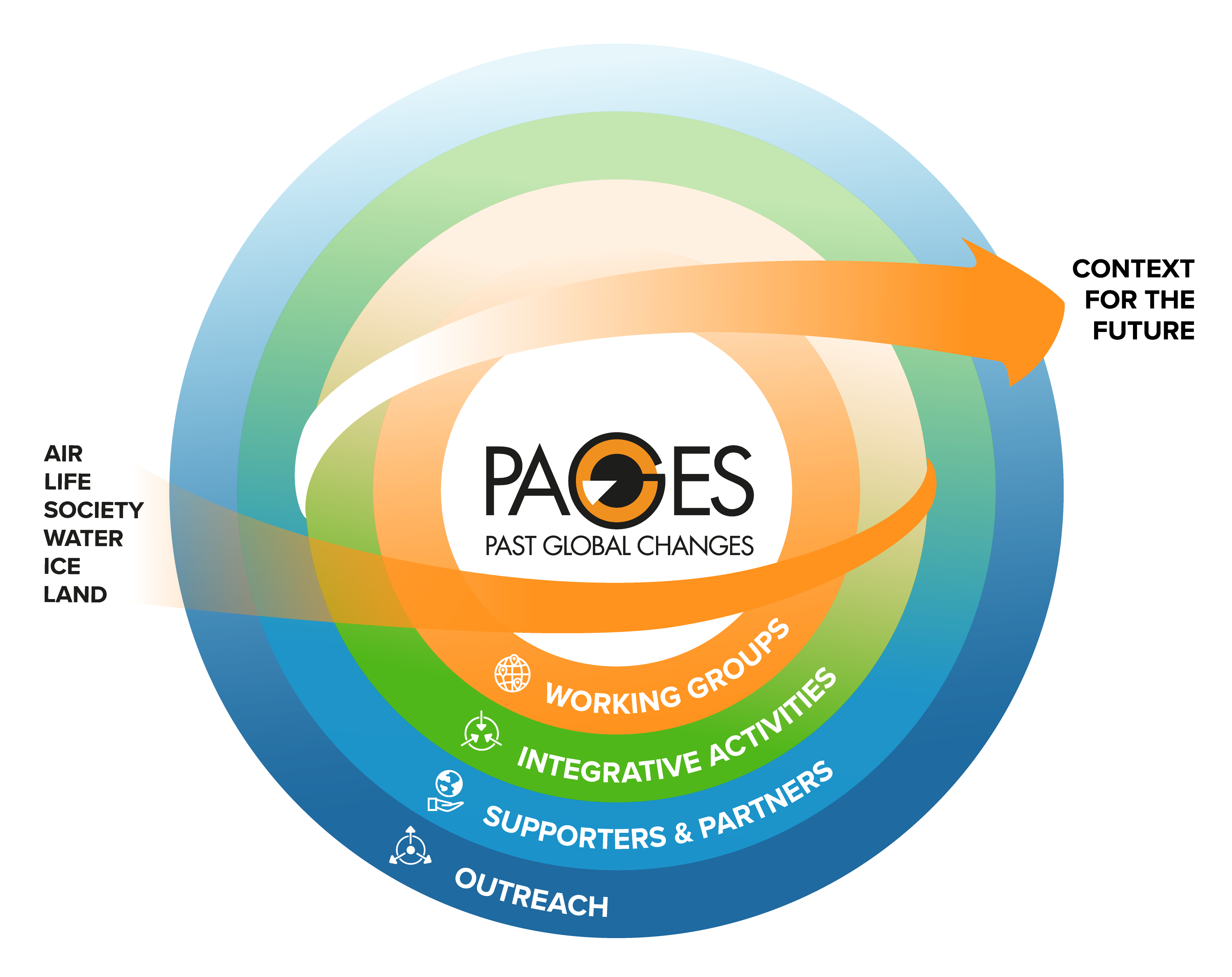- Home
- About PAGES
- General Overview
General overview
PAGES (Past Global Changes) provides support for the gathering and synthesis of observations, reconstructions, and the modeling of climate, ecosystem, environmental and societal dynamics in the past.
> Nikita Kaushal and Lukas Jonkers explain PAGES in this short, easy-to-understand, video (3.48).
> Former co-chair Hubertus Fischer explains the role of PAGES in this short (1:30) YouTube video.
We encourage international and interdisciplinary collaboration and seek to promote the involvement of early-career researchers and scientists from low- and middle-income countries.
PAGES' scope of interest includes the physical climate system, biogeochemical cycles, ecosystem processes, biodiversity, and human dimensions, on all timescales within paleoscience, including the deep past.
Over 5000 scientists from more than 125 countries currently subscribe to PAGES. We encourage all interested scientists to get involved and contribute to our initiatives, participate in the workshops we support, and publish PAGES-relevant products. PAGES also organizes travel stipends for Guest Scientists.

The PAGES universe
Our science structure addresses key components of the Earth system: in particular, phenomena and processes that link the atmosphere, oceans, cryosphere, land surface, biosphere and society.
PAGES itself is not a research institution. Research activities are not prescribed by PAGES committees nor by the International Project Office (IPO). Rather, we maintain the required flexibility in our budget and structure to respond to 'bottom-up' initiatives that arise from the community.
The agreed-upon PAGES' vision is implemented primarily through community-devised working groups. In addition, integrative activities bring together working group members and researchers from the broader environment to collaborate on specific issues.
Supporters and Partners
Founded in 1991, PAGES was funded by the US and Swiss National Science Foundations until 2016. From 2017-2018, it was funded by the US National Science Foundation and the Swiss Academy of Sciences. From 2019, it has been funded by the Swiss Academy of Sciences and the Chinese Academy of Sciences. It is supported in-kind by the University of Bern, Switzerland.
PAGES is a Global Research Network of the global sustainability science program Future Earth, and was previously a core project of the International Geosphere-Biosphere Programme (IGBP) until its closure at the end of 2015. PAGES also has a scientific partnership with the World Climate Research Programme (WCRP), WDS-Paleo, and the Inter-American Institute for Global Change Research (IAI). Read more ...
Stakeholders
PAGES aims to engage relevant stakeholders in its activities at a number of levels. Increasing stakeholder engagement is a critical goal of our parent organization, Future Earth, as it works to ensure knowledge is generated in partnership with society and the users of science. Read more ...
Open science and research assessment
Openness in science is a fundamental requirement to ensure the integrity of research, accelerate scientific progress, and disseminate knowledge among scientists, decision-makers, and the general public. In this context, PAGES recommends using best practices to share scientific knowledge by making all stages of the research processes findable, accessible, and reusable, while ensuring equitable data governance. For this reason, PAGES encourages making data available according to the FAIR data principles (findable, openly accessible and interoperable), and engaged with CARE Principles to guarantee Indigenous Peoples rights and interests.
Furthermore, PAGES endorses the promotion of the evaluation of scientific work and career paths on the basis of scientific content and research performance according to the Declaration of San Francisco on Research Assessment (DORA Declaration).
Organizational structure
PAGES is overseen by a Scientific Steering Committee (SSC) comprised of members chosen to be representative of the major techniques, disciplines and geographic regions that contribute to paleoscience.
Under the direction of the SSC, the staff at the small International Project Office (IPO) in Bern, Switzerland, carry out the day-to-day running of the PAGES program.
Be involved
There are many ways you can learn more and get involved!
Create a profile in our People Database and subscribe to receive free copies of PAGES Magazine and other updates.
Subscribe to the mailing list of any of our working groups to get updates on the group's activities. The mailing list links are on their webpages.
Read the Be involved webpage for other opportunities to be active in the PAGES community.